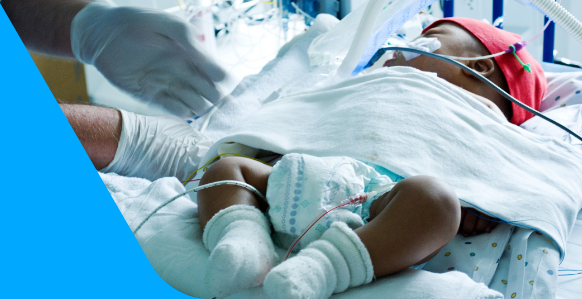If your baby has been born prematurely or with a birth defect or other complication, she may need special care that is too involved to be provided in a standard newborn nursery. Not all hospitals have NICUs, so your baby may have to be transferred here from the facility where she was born.
At first the NICU may seem like a stark, bleak and very noisy place filled with tubes, wires, dials, bright lights and alarms.
Don't let the sounds in the NICU scare you. Most of the equipment attached to the babies have built-in alarm systems. Anytime the equipment's monitoring systems sense a change, an alarm sounds to alert the staff. These alarms do not always mean something is wrong with a baby, but they may require a response from the staff.
The staff watch these machines closely and are always prepared to take care of any problem that may occur.
To help you become familiar with the people caring for your baby, we've listed titles and descriptions of your NICU staff below.
Use this as a general guideline. Your hospital may have fewer or more members on their NICU staff.
- Neonatologist: A paediatrician (children's doctor) with advanced training in the area of intensive care newborn medicine. You may find that the neonatologist in charge of the NICU unit will change. These doctors may work on a rotating basis. The neonatologist in charge is called the “attending” doctor. Your baby may have one attending doctor during the day and a different one at night.
- Fellow: A fully trained and experienced paediatric (children's) doctor who is training to become a neonatologist.
- Resident: A medical doctor who is specializing in paediatrics (children's medicine). The residents are actively involved in your baby's care and are a good resource for information.
- Neonatal Nurse Practitioner: A nurse who has completed an advanced educational program in neonatology and works under the direction of the neonatologist.
- NICU Nurses: Your baby will have one or more nurses assigned to each shift. Shifts may vary between eight and twelve hours. The nurses try to care for the same babies when they work.
- Primary Nurse: The primary nurse plans your baby's nursing care and is responsible for getting to know you and your baby, and any special needs you may have. The primary nurse's name is often written on your baby's name card which hangs above the crib. This nurse is the nurse most intimately acquainted with your baby's needs and will guide your baby's individualized plan of care.
- Respiratory Therapists: Respiratory therapists are specially trained to care for patients with breathing difficulties. They also are experts on the medical equipment used to treat these types of problems. Respiratory therapists are available in the NICU 24 hours a day. If your baby is having any type of breathing difficulty, you will often see the respiratory therapist at her bedside. They would be happy to answer your questions regarding your baby’s lungs.
- Newborn Unit Social Worker: If your hospital has a social worker, you may find them to be a great support for your family. They can also help arrange for housing, transportation, and meals; clarify hospital policies and procedures; alert the attending doctor or fellow of your questions and concerns; identify resources such as parent groups, reading materials, and computer resources; and assist in planning your baby's follow-up care at the time of discharge. Some hospitals have space that allows a parent to stay with his or her baby. The social worker will explain what accommodations are available so that you can stay as physically close to your baby as possible.
- Other Caregivers: Depending on your baby's needs, she may require the care of other specialized doctors. They will be introduced to you, if necessary for your baby's care. While this may seem like a lot of information to process, you'll soon learn and become comfortable with the NICU routine.
Don't be afraid to ask questions.
The NICU staff is working for you and your baby and is there to help you in any way it can. Remind yourself often that although staying in the NICU isn’t what you had envisioned would happen to your baby, it is necessary. This special place exists to help the baby you love.







